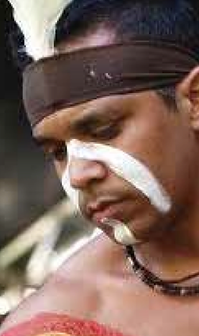
'building communities' capacity through empowerment, healing and leadership.'
NATIONAL EMPOWERMENT PROJECT
Building communities' capacity through empowerment and strengthening
cultural, social and emotional wellbeing.
KURANDA CONSULTATIONS & RESEARCH FINDINGS
In Kuranda, a total number of 78 participants were consulted through community focus groups/workshops and one-to-one interviews.
These community consultations with local Aboriginal and Torres Strait Islander peoples living in Kuranda and its surrounding communities of Mona Mona, Kowrowa, Mantaka and Koah showed that people perceived a number of critical issues for individuals, families and communities.
Lack of employment opportunities, lack of access to transport, and concerns about physical and mental health were also seen as specific concerns about the future of the young people, given that the community had little to offer.

“We need to come together to work with each other in the community to create programs etc., to keep our community alive and we need to act as ONE.”
The impact of family feuding and community division has caused considerable distress within Kuranda. Many participants felt that it was time for the families and communities to come together as one again. Further, a need for more cohesion within families across all communities within the area was seen to be of utmost importance.
Despite problems, there was a sense of great hope for the future and people were able to identify solutions and positive strategies that could be used to address problems. Participants said that building personal esteem and confidence were some of the ways of having a significant impact on making individuals strong. More positive attitudes, experiences and communication skills were needed.




“Community not unified. When it comes to dealing with housing, education, health, social justice issues – there’s too much division in the communities.(Drugs) effects their moods. Effects how they deal with easy, everyday tasks. How they communicate with others (can go from happy to angry in a second). How they deal with problem solving (frustration can set in very quickly).”
The people identified that there was a need for community leadership: to empower community members and to build a cohesive unified supportive strong community that would provide the background for stronger people and families.
Many people have experienced intergenerational trauma as children of Stolen Generations and those consulted said that greater family support was required in order to make individuals strong again, including support for counselling, positive parenting and greater awareness and education for children about families and kinship. In addition, there was a need to strengthen cultural connections and practices.

Connection to culture, including a strong focus on the need to reintroduce and teach local languages was something that many participants felt was needed to make them strong. The role of Elders within the community was seen as needing to be promoted and supported. Ensuring all community members had respect for Elders was an issue that was raised on many occasions.

Overall, the participants felt that a range of community programs were needed and that these should be community oriented. That is, the whole community needs to be engaged in all phases of program development. Any program should also be delivered within the local community and within culturally appropriate settings.
Further, delivery of programs should be by the local community people themselves, and should include mechanisms that allow for local people to be trained as skilled facilitators. Many of those engaged throughout the community consultations felt that any program will only be successful if local people are engaged and have ownership over the development and delivery.

